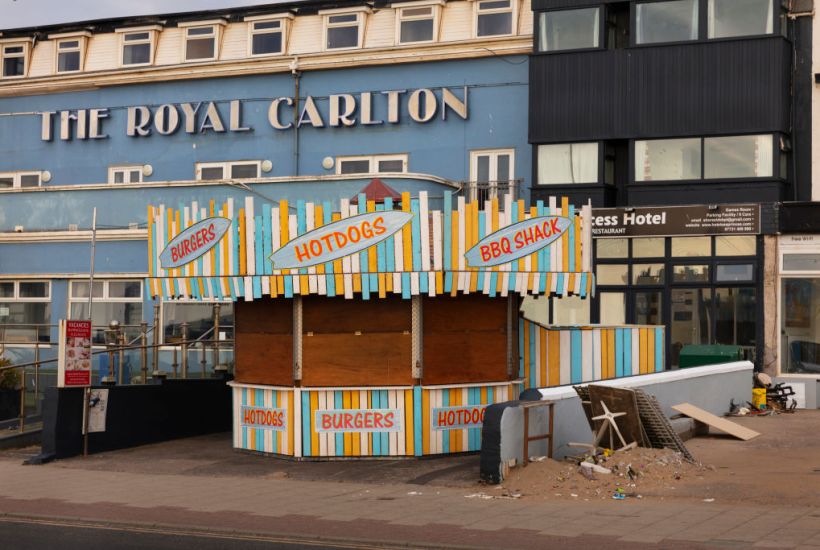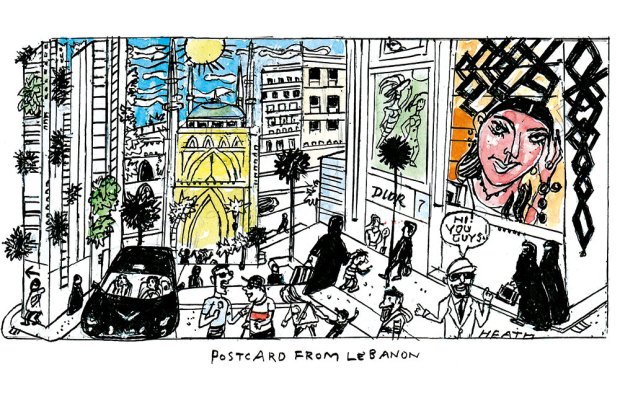It’s mid-afternoon in the Royal Oak pub in Blackpool and Liv has arrived to sell a bag full of stuff she’s stolen from the supermarket. She’s got fabric conditioner, soap, Creme Eggs and a large bar of Dairy Milk. She pulls in a few pounds and then leaves to score some crack. ‘Everyone struggles,’ says a man watching her sell. Lots of people here don’t work. People earn money however they can.
Neither Labour nor the Tories come here for their conferences any more. They prefer big cities with nicer hotels
In Blackpool, you see the worst of Britain’s welfare crisis. More than a quarter of the city’s working-age residents are on out-of-work benefits, the highest proportion in the UK and twice the national average. In parts of South Shore – right near the promenade, and home to a once-strong tourism industry – it’s closer to 60 per cent. There used to be circuses and casinos, and Peter Kay once filmed here. That’s all gone. Most locals feel as if there’s no hope of a better life. Universal credit reform was supposed to come with ‘universal support’; the ‘levelling-up’ agenda was supposed to sort out the area. But the promised help never arrived.
Next to the Royal Oak, there was once a bingo hall called the Apollo. It was plush and grand with Art Deco furnishings. It closed in 2009 – the same year the regional office of the Department for Work and Pensions was shuttered. There used to be a market near the pub, too. ‘You could buy anything you wanted,’ Geoff, 67, tells me. He fondly remembers buying cheap knock-off alcohol near Lytham Road. Now there are only takeaway shops, off-licences and hardware stores – and many of these are also closing down. No one seems to care about Blackpool any more.
Geoff once worked in a car factory, making exhaust pipes that got sent on to Sunderland or Liverpool. After a day’s work, he’d go down to the job centre and say he was unemployed to give his salary a bump. He’d turn up in a high-vis jacket, coated in dust from the factory. They’d ask if he’d worked in the past few weeks. Not a minute, he’d reply. The official figures didn’t pick up people like Geoff: considered workless by the state but doing undeclared work to get by. They still don’t. High penalties, such as tax or the cost of coming off welfare, force people into an informal economy with low pay and little protection.
‘You have to live off your wits in this town,’ says Geoff. There’s a ‘grey market’ for work in Blackpool, as in many other places in Britain. When a big show comes here, a Mercedes van parks up behind the promenade, opens its back door and drops people off to beg. At the end of the night, they return to the van and hand the cash to the driver. It sounds more like slavery than freelance earning. Locals say the off-licences are just fronts for drug money, too. Lots of work is cash-in-hand.
Many people in Blackpool are really too ill to work. The health service is in a bad way. Opposite the pub, a man called Pete, 55, says that he’s on disability benefits for a fractured lower spine, osteoarthritis and chronic obstructive pulmonary disease. He can feel the bones in his back clatter when he walks. He worked at the Apollo for 17 years but says he hasn’t had a proper job since it closed. ‘All the government wants to do is get you into work,’ he says. The DWP website lists 178 ‘disability confident’ jobs open in Blackpool, but that’s not enough for everyone here. The department’s own numbers show 7 per cent of the town to be on incapacity benefit.
South Shore is the sort of place that Boris Johnson promised to improve. There are job vacancies in Blackpool – 7,000 listed on one jobs website – but everyone says there’s no work. It can be hard to square. Online, there are vacancies as a hotel night receptionist for £10.50 an hour, or a £30,000-a-year bar manager, but people in South Shore say it’s not real work – most of the jobs dry up after the summer, when the tourists leave. No one comes here in February. Some people save enough money in the summer to get them through the winter months; others end up homeless or in temporary accommodation.
Back in the Royal Oak, a homeless man called Stephen says he came here from Mansfield in search of a better life. ‘Everyone thinks Blackpool’s streets are paved with gold,’ says a man by the bar. It was in Blackpool, in 2005, that David Cameron launched his bid for the leadership of the Tory party with a no-notes conference speech that turned him from nobody to favourite. Four years later, in Blackpool again, Cameron attacked a welfare system that he said meant some kept just 4p in every extra pound they earned. People had been sent an unhelpful message by a broken system, he said: ‘From every extra pound you earn we’ll take back 96p. Yes, 96p. Let me say that again, slowly.’
Cameron didn’t do enough to fix the old system. Last year, when the Nobel Laureate Angus Deaton published his review into the UK welfare system, he found that it is still ‘not uncommon for lone parents to face a marginal effective tax of 96 per cent’. In places such as Blackpool, the welfare trap is at its worst and creates a sense that the system is rigged against the poorest people.
Neither Labour nor the Conservatives come to Blackpool for their conferences any more. Both parties prefer big cities with nicer hotels and restaurants, better suited to party donors and corporate sponsors. Perhaps they’re just too embarrassed. Politicians made promises here but never delivered. Even the Royal Oak is set to close next month. ‘I’m leaving. I’m done with it,’ says one shop owner, who sells food and hardware. ‘They’ve killed Blackpool.’<//>
Got something to add? Join the discussion and comment below.
Get 10 issues for just $10
Subscribe to The Spectator Australia today for the next 10 magazine issues, plus full online access, for just $10.
You might disagree with half of it, but you’ll enjoy reading all of it. Try your first month for free, then just $2 a week for the remainder of your first year.














Comments
Don't miss out
Join the conversation with other Spectator Australia readers. Subscribe to leave a comment.
SUBSCRIBEAlready a subscriber? Log in